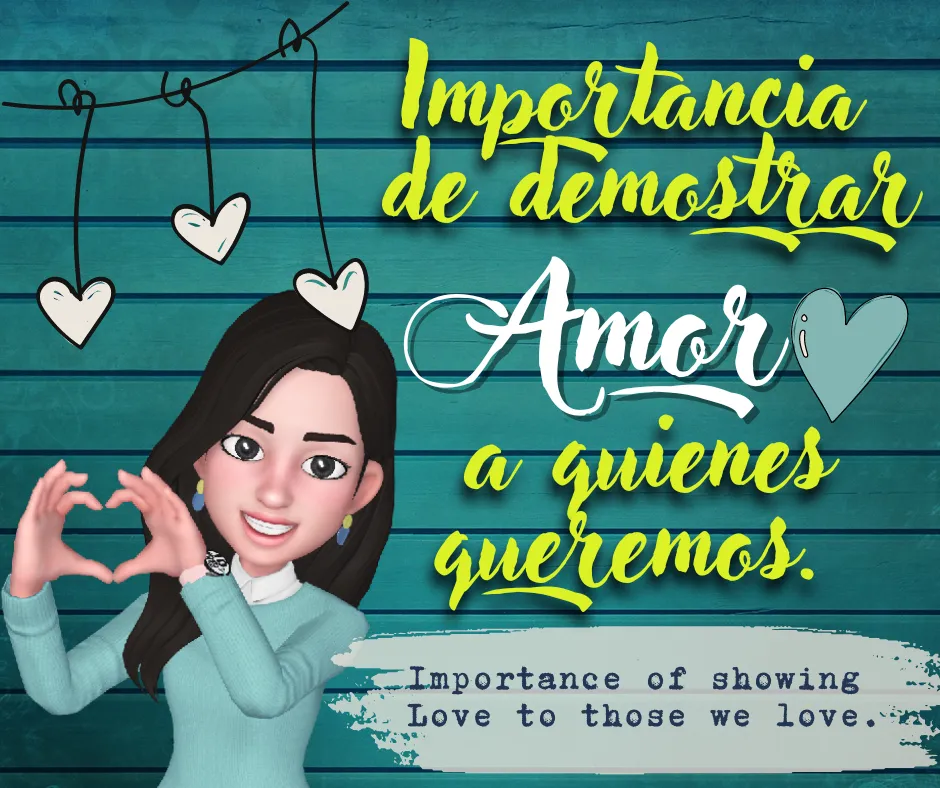

¡Saludo amigos de #hive! esta semana decidí hablarles de un tema super importante que surgió luego de una conversación con unas amigas y es la importancia de hacerles saber a quienes queremos el valor de lo que ellos significan para nosotros.
Voy a empezar diciendo que, como una persona que perdió a un ser querido a muy temprana edad, puedo decir ciento por ciento seguro de que debemos decirles a quienes apreciamos cuánto los queremos y significan para nosotros en cada momento que sea posible y nunca debería considerarse demasiado.
Muchos tienden a pensar que no es necesario, que es algo sobreentendido y que tener que darlo a conocer no es de importancia cuando la relación ya lleva tiempo de establecida, por ejemplo, la de un padre con sus hijos, la de hermanos o la de unos esposos que llevan tiempo casados.
Y la verdad ¡no hay nada más alejado de la realidad que esto! cuando hablamos de relaciones prolongadas, sea cual sea, deben prevalecer muchas cosas, porque básicamente es un acuerdo entre las partes en donde debe haber un equilibrio entre dar y recibir por cada uno, pero el cariño y el respeto mutuo es la base para mantenerse y eso en definitiva ¡no es negociable!
¿Cómo mantenemos el cariño y el respeto mutuo? Pues ¡demostrándolo! ¿Cómo lo demostramos? ¡Con hechos y palabras! y digo con hechos y palabras porque muchas veces los hechos son difíciles de llevar a cabo, a veces por ejemplo un niño piensa que su papá si no le compra un juguete es porque no lo quiere y es ahí cuando es deber del padre hacerle entender con palabras que lo quiere y la razón del por qué no puede comprarle el juguete y que el juguete no es sinónimo de querer.
Greetings #hive friends! this week I decided to talk to you about a super important topic that came up after a conversation with some friends and that is the importance of letting those we love know the value of what they mean to us.
I'll start by saying that, as a person who lost a loved one at a very young age, I can say one hundred percent for sure that we should tell those we cherish how much we love them and they mean to us at every possible moment and it should never be considered too much.
Many tend to think that it is not necessary, that it goes without saying and that having to make it known is of no importance when the relationship has been established for some time, for example, that of a parent with their children, of siblings or of spouses who have been married for some time.
And the truth is, there is nothing further from reality than this! When we talk about long relationships, whatever it is, many things must prevail, because basically it is an agreement between the parties where there must be a balance between giving and receiving for each other, but mutual affection and respect is the basis to maintain and that is definitely non-negotiable!
How do we maintain affection and mutual respect? Well, by showing it. How do we show it? With deeds and words! and I say with deeds and words because many times deeds are difficult to carry out, sometimes for example a child thinks that if his father does not buy him a toy it is because he does not want it and that is when it is the father's duty to make him understand with words that he loves him and the reason why he cannot buy him the toy and that the toy is not synonymous with love.

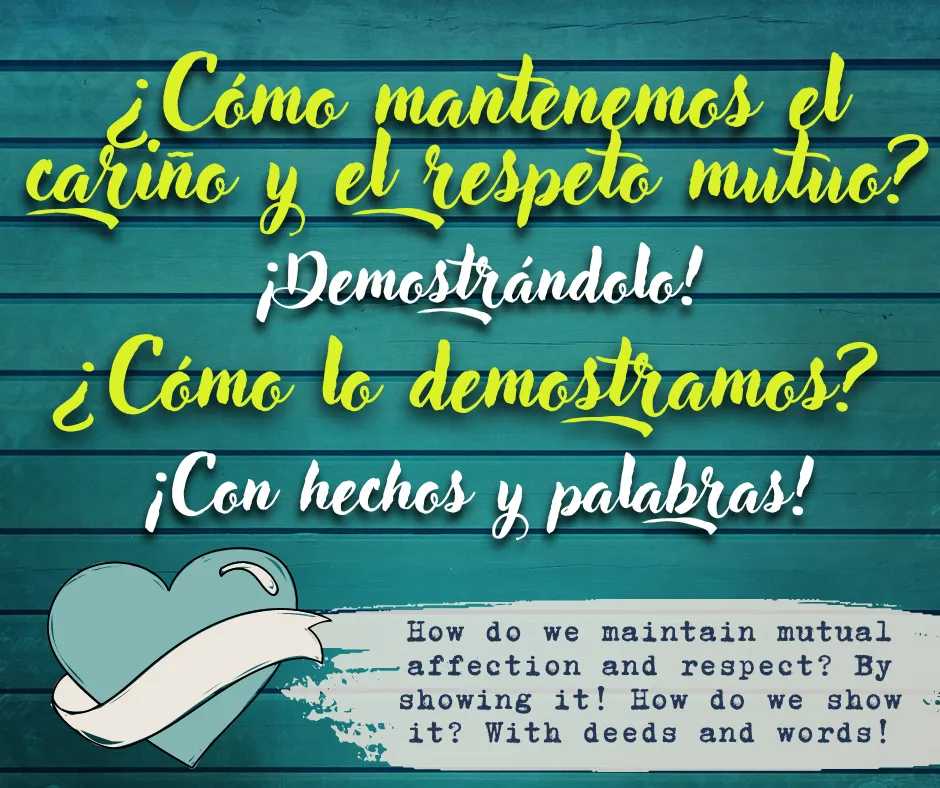

En las relaciones de pareja es un asunto más profundo y complejo porque no hay lazos sanguíneos, no hay ningún lazo permanente que los una, por lo que es importante si quieres mantener el lazo a largo plazo darle a entender a la otra persona que es eso es lo que deseas, sino corres el riesgo de que ese lazo, que no es del todo fuerte, pueda romperse en algún momento.
El demostrar cariño a través de las palabras es una forma de recordarle al otro que, independientemente del tiempo, las circunstancias, las distancias, los problemas, las carencias, las discusiones, etc, sigues manteniendo el mismo cariño por esa persona.
Estamos conscientes de que el amor de pareja no es estático, se transforma, de que evidentemente con el pasar del tiempo ya no habrá enamoramiento, pero sí debería existir amor ¿cierto?, ¿si no, para qué estar juntos?
Ese amor es importante demostrarlo con hechos más que con palabras ¡es cierto! Sin embargo, algunas veces no podemos hacerlo con hechos; puede ser por muchos factores como la distancia, exceso de trabajo o cuando se pasa poco tiempo con la persona amada, por ejemplo, y es allí cuando más debemos recurrir a las palabras. Por supuesto siempre haciéndole entender al otro por qué no puedes con los hechos y, por ahora, sólo puedes con las palabras.
He conversado con personas que me dicen que a sus parejas les cuesta decirles que los quieren o lo que sienten por ellos y yo me pregunto ¿hay realmente ahí enamoramiento o amor cuando alguien le cuesta decirle a otro lo que siente por ellos? La respuesta es, tal vez sí, tal vez no, nunca lo sabremos porque sencillamente ¡no lo expresa! Pero a simple vista la balanza se inclina a que No.
In couple relationships it is a deeper and more complex matter because there are no blood ties, there is no permanent bond that unites you, so it is important if you want to maintain the bond to let the other person understand that this is what you want, otherwise you run the risk that this bond, which is not entirely strong, may break at some point.
Showing affection through words is a way of reminding him/her that, regardless of time, you still have the same affection for that person. We are aware that the love of a couple is not static, it transforms, that obviously with the passing of time there will no longer be infatuation, but there should be love, right, if not, why be together?
It is important to show that love with deeds more than with words, it is true! However, sometimes we can not do it with facts; it can be due to many factors such as distance, overwork or when we spend little time with the loved one, for example, and that is when we must resort to words. Of course, always making the other person understand why you cannot do it with facts and for now you can only do it with words.
I have talked to people who tell me that their partners find it hard to tell them that they love them or how they feel about them and I ask myself, is there really love or infatuation when someone finds it hard to tell another how they feel about them? The answer is, maybe yes, maybe no, we will never know because they simply don't express it!

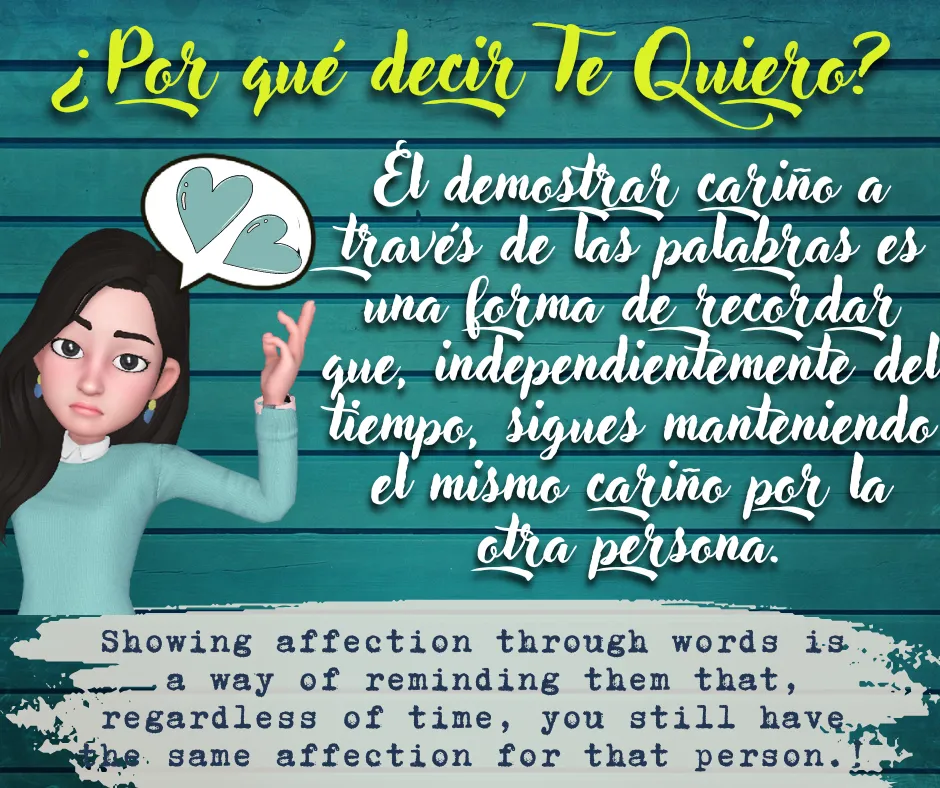

Otras amigas me han dicho que sienten que prácticamente obligan a otras personas a decirles "te quiero" y otras que la otra persona los hace sentir mal porque les responden que "exageran" al escucharlo tantas veces y que ¡no van a hacer lo mismo! Imagínense cómo se sienten esas amigas ¿verdad que suena muy triste y dan mucha pena ajena?
Por supuesto terminan sintiéndose ¡MUY mal! porque están minimizando sus demostraciones de cariño, sus necesidades afectivas de escuchar una demostración de amor de quien quieren, inseguras de que sí de verdad sienten lo que ellas creen que sienten por ellas e invalidando completamente sus emociones.
Cuando una persona invalida las emociones de otras es cuando de forma consciente o inconsciente minimiza, inhibe, o sencillamente menosprecia los sentimientos de otros; en términos muy sencillos le dice o le hace sentir: "no me importa lo que sientas", "lo que sientes está mal" y de ahí derivan otras cosas como: "eso que necesitas es una exageración y un capricho", "es tu culpa sentirte así y no mía", "eres una exagerada por molestarte por eso", "lloras por todo", "eres una dramática", "no me importa lo que tú necesites"
Las emociones son eso y nada más: "emociones" con toda propiedad puedo decirles que las emociones de cada persona importan y no es su culpa sentirlas; las emociones se originan en el cerebro amigos, a menos que esa persona te quiera manipular y te está mintiendo, solo está expresado lo que su cerebro le está haciendo sentir producto de lo que está percibiendo y dudo que si te está diciendo "te quiero" o "te amo" quiera manipularte, mentirte y, básicamente "suplicarte" por demostraciones de cariño.
El que tú no las sientas o no entiendas, no significa que esas emociones no valen nada y que debes menospreciarlas o hacerlos sentir mal por lo que sienten. Si quieres expresar tu punto de vista sobre una emoción de alguien aprende a usar inteligencia emocional con ella.
Siendo comprensivo y actuando de forma empática podrás darle a entender a esa persona, con las palabras adecuadas, por qué lo que siente está un poco fuera de lugar, pero no le digas palabras hirientes, ni de una forma amenazante o molesta, porque de así no vas a lograr nada más que hacerla sentir peor de lo que ya se siente por expresar lo que siente y, sí esa persona te importa, dudo que quieras eso ¿o me equivoco?
Other friends have told me that they feel like they practically force other people to say "I love you" to them and others that the other person makes them feel bad because they respond that they "overdo it" by hearing it so many times. Imagine how those friends feel, doesn't it sound so sad?
Of course they end up feeling VERY bad! because they are minimizing their demonstrations of affection, their affective needs to hear a demonstration of love from the one they love, insecure that they really feel what they think they feel for them and invalidating their emotions.
When a person invalidates the emotions of others is when they consciously or unconsciously minimize, inhibit, or simply belittle the feelings of others; in very simple terms they say or make them feel: "I don't care what you feel", "what you feel is wrong" and from there derive other things like: "what you need is an exaggeration and a whim", "it's your fault you feel that way and not mine", "you are an exaggerator for bothering about it", "you cry about everything, you are a dramatist", "I don't care what you need"
**Emotions are just that and nothing more "emotions" with all propriety I can tell you that each person's emotions matter and it is not their fault to feel them, emotions originate in the brain my friends, unless that person wants to manipulate you and is lying to you, they are only expressing what their brain is making them feel as a product of what they are perceiving and I doubt that if they are saying "I love you" or "I love you" they want to manipulate you or lie to you and basically beg you for demonstrations of affection.
Just because you don't feel them or understand them, doesn't mean they are worthless and that you should belittle them or make them feel bad about how they feel. If you want to express your point of view about someone's emotion, learn to use emotional intelligence with them, this way you will be able to make that person understand why what they feel is a little out of place, but don't say hurtful words, or in a threatening or annoying way, because that way you are not going to achieve anything more than making them feel worse than they already feel for expressing what they feel and, if you care about that person, I doubt you want that, do you?

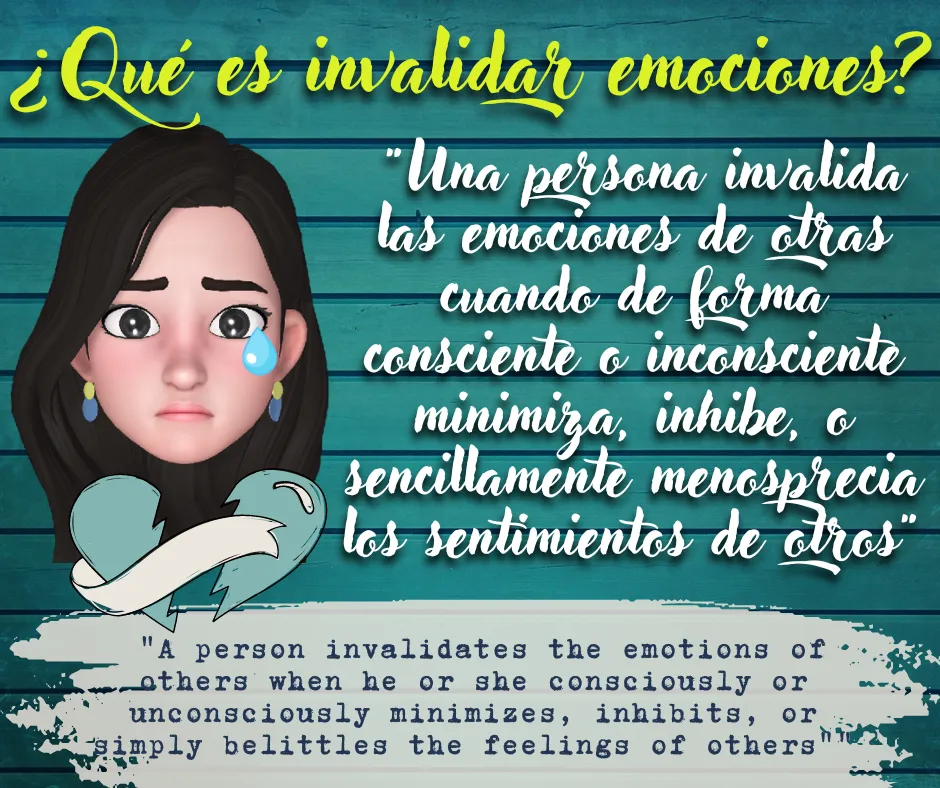

Me desvié un poco del tema hablando de los ejemplos de mis amigas, pero volviendo al punto de las demostraciones de cariño, estoy consciente que hay relaciones que se acostumbran a demostrar diariamente lo que sienten el uno por el otro de muchas formas, en esos casos muchísimas veces sobran las palabras.
Hay otras personas que no piden mucho en las relaciones, solo que los quieran, los traten bien, les den el valor que merecen y se los hagan saber; yo pienso que son justamente estas personas las que realmente le dan la importancia que merecen a las palabras "te quiero" o "te amo", son ellas en las que no hay absolutamente duda de que el sentimiento es verdadero.
Por otro lado, algunas personas prefieren aspectos materiales como demostración de cariño. Que les regalen objetos de valor, que las saquen a comer, o que los inviten a ciertos lugares, para esas personas los gestos valen más que las palabras; sin embargo, hay un hilo muy delgado entre el verdadero sentimiento de amor y el interés, y en ese caso hay que tener mucho cuidado y aclararlo.
Muchas personas tienden a pensar que, si no hay demostración de afecto con estos detalles, entonces no sienten lo que creen por ellas o no están interesadas realmente en ellas; estas personas se sienten bien al recibir un detalle por muy pequeño que sea o el simple hecho de pensar que su pareja se tomó el tiempo de seleccionar un lugar para pasar el día con él o ella, y en ese caso no está mal, siempre y cuando no haya interés de por medio y la otra persona esté totalmente seguro de eso.
Por supuesto el amor también se puede demostrar con aspectos que no necesiten ningún gasto monetario, como estar al pendiente de la otra persona en el día, ¿preguntarle cómo está?, ¿Si comió?, ¿Si durmió bien?, ¿Cómo estuvo el trabajo?, ¿En qué puede ayudarlo para resolver algún problema que tenga?, ¿puede ayudarlo con su trabajo? En general demostrar interés en él y en su vida
I deviated a little from the topic talking about the examples of my friends, but returning to the point of the demonstrations of affection, I am aware that there are relationships that are used to demonstrate daily what they feel for each other in many ways, in those cases many times words are superfluous.
There are other people who do not ask for much in relationships, only to be loved, to be treated well, to be given the value they deserve and to be let know; I think that these are the ones who really give the importance they deserve to the words "I love you" or "I love you"; they are the ones in whom there is absolutely no doubt that the feeling is true.
On the other hand, some people prefer material aspects as a demonstration of affection. They give them valuable objects, take them out to eat, or invite them to certain places, for those people gestures are worth more than words; however, there is a very thin thread between the true feeling of love and interest, and in that case you have to be very careful and make it clear.
Many people tend to think that, if there is no demonstration of affection with these details, then they do not feel what they believe for them, they are not really interested in them; they feel good to receive a detail no matter how small it is or the simple fact of thinking that their partner took the time to select a place to spend the day with him or her, and in that case it is not wrong, as long as there is no interest involved and the other person is totally sure of that.
Of course love can also be demonstrated with aspects that do not require any monetary expense, such as being attentive to the other person during the day, asking how he/she is, if he/she ate, if he/she slept well, how was work, how can you help him/her to solve any problem he/she has, can you help him/her with his/her work?

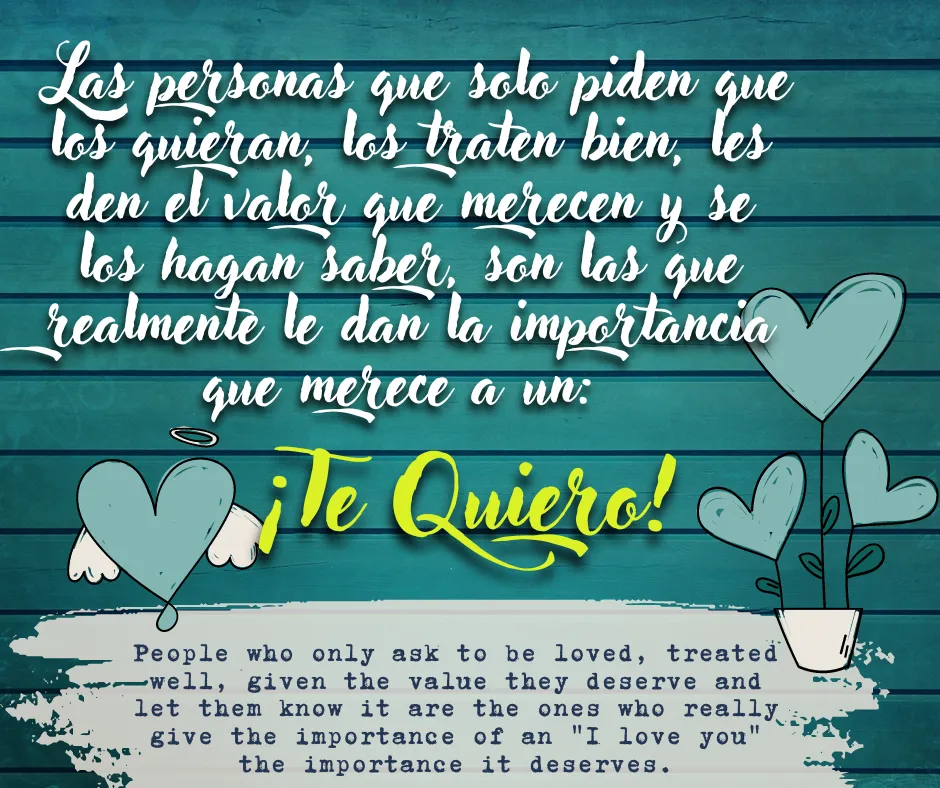

Están las demostraciones de amor físicas como los abrazos, los besos o el pasar tiempo de calidad juntos; considero que esta sería la demostración de amor ideal sin tener que usar las palabras o elementos materiales, aunque, aun así, repito, las palabras ¡nunca están demás! porque el asumir cosas que piensan los demás ¡no ha sido buena idea, en absolutamente nada en la vida! Y eso está más que demostrado.
Como una persona que creció en el seno de una familia disfuncional donde casi nunca, por no decir ¡nunca! se dijeron palabras de cariño, pero que aprendí siendo adulta las cosas que hicieron mal mis padres para entenderlos, perdonarlos y no reproducirlas yo después, puedo dar fe de la importancia de demostrarle a los niños el valor de decirles "te quiero" o "te amo" y de que ellos aprendan el significado de esas palabras desde muy pequeños.
En mi familia mis padres no fueron así con nosotros, nunca nos dijeron "te quiero" o por lo menos no que yo lo recuerde, así que si lo hicieron probablemente fue cuando era bebé y no tenía nada de consciencia de lo que significaba la palabra y tampoco la iba a recordar después.
Mi papá tiene una personalidad muy fuerte y poco expresiva, ahora que tengo conocimientos de psiquiatría sé que, justamente por eso, todos mis hermanos crecimos con problemas de seguridad y algunos problemas emocionales, y es que el decir "te quiero" o "te amo" es sinónimo de, además de cariño, respeto, compromiso y admiración por el otro.
Esas simples palabras significan para un niño que aun cuando las cosas les salgan mal, sepan que tienen un lugar seguro al que puedes regresar, porque ese lugar está en el corazón de esa persona que te quiere, pero la única forma de ellos estar verdaderamente conscientes de eso es que se los expresen con palabras, ya después cuando sean adultos lo entenderán de otras formas.
There are the physical demonstrations of love such as hugs, kisses or spending quality time together; I consider that this would be the ideal demonstration of love without having to use words or material objects, although, even so, I repeat, words are never too much because assuming things that others think has never been a good idea in absolutely anything in life! And that is more than proven.
As a person who grew up in a dysfunctional family where words of affection were almost never, if not never! said, but who learned as an adult the things my parents did wrong in order to understand them, forgive them and not reproduce them later, I can attest to the importance of showing children the value of telling them "I love you" or "I love you" and that they learn the meaning of those words from a very young age.
In my family my parents were not like that with us, they never told us "I love you" or at least not that I remember, so if they did it was probably when I was a baby and I had no awareness of what the word meant and I wasn't going to remember it later either.
My dad has a very strong and not very expressive personality, now that I have knowledge of psychiatry I know that, precisely because of that, all my siblings grew up with security problems and some emotional problems, and is that saying "I love you" or "I love you" is synonymous with, in addition to affection, respect and admiration for the other.
Those simple words mean to a child that even when things go wrong, they know that they have a safe place to return to, because that place is in the heart of that person who loves you, but the only way for them to be truly aware of that is to express it in words, and later when they are adults they will understand it in other ways.

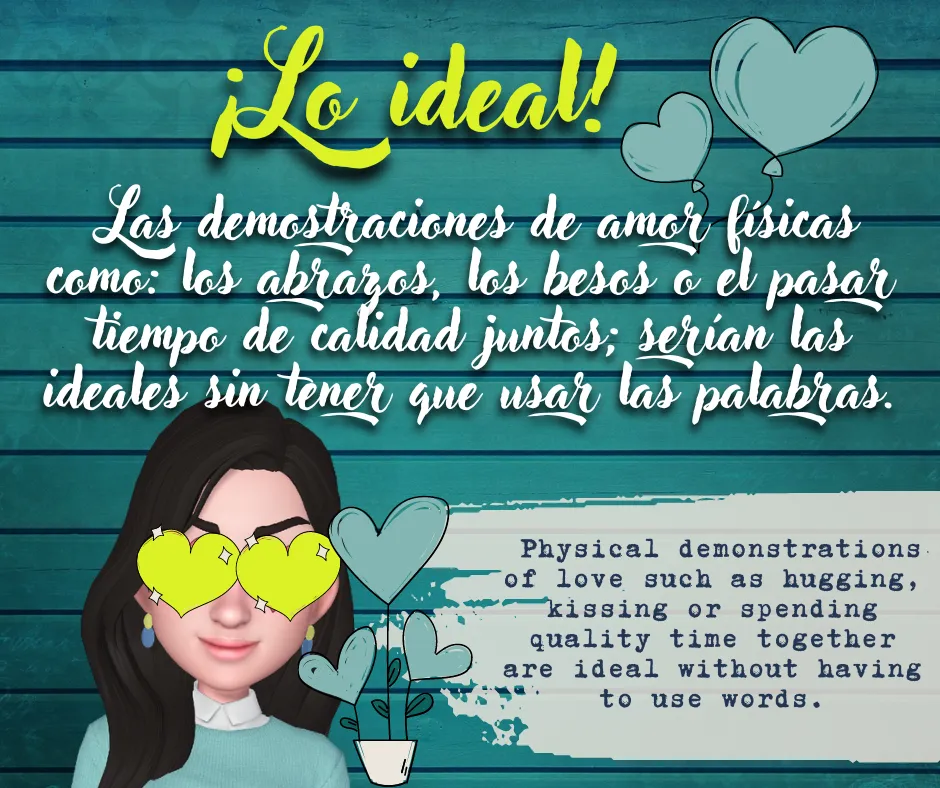

Como les comentaba arriba tuve una pérdida de uno de los componentes más importantes de mi familia (mi hermana mayor) cuando yo era muy joven y creo que nunca le dije "te quiero", mucho menos "te amo" y no saben ¡cuánto daría! por retroceder el tiempo y poder abrazar a mi hermana todos los días, pero sobre todo decirle "te quiero" y "te amo" cada segundo de mi vida y hacerle 1500 demostraciones de cariño más.
"La gente no sabe lo que tiene hasta que lo pierde" esta es una frase que vemos por ahí, muchos la leen y ni le dan importancia, y es ¡tan! pero ¡tan real! Pero no a todos los aprendizajes les llegan por igual; a algunos estos aprendizajes les llegan cuando realmente es ¡muy tarde! y ya no hay nada que hacer.
Después que pierden eso que era tan valioso para ellos, tristemente pasan la vida arrepintiéndose por cosas que dejaron de hacer para demostrar el valor de lo que significaban esas personas para ellos; luego entienden que forma parte de su crecimiento como persona y que cometieron un error como cualquier ser humano, así que maduran y aprenden sobre lo que verdaderamente importa en la vida y lo que ¡nunca más! deben repetir.
Seré honesta, yo no tengo mucha experiencia personal en relaciones de pareja, aunque puedo decir que sí aprendí mucho con esa única que tuve, porque fue bastante estable y duradera (10 años para ser exacta) pero, como muchas cosas en la vida, un día llegó a su fin porque se acabó el amor.
Por eso no puedo decir que soy experta en relaciones amorosas ¡para nada! pero sí puedo decir que el haberme dedicado a esta carrera me ha hecho ver la vida a través de los ojos de otras personas, aprender mucho a través de ellas y no solo por mi experiencia.
He podido ver muchas relaciones y familias disfuncionales, y sé cuándo una persona está dando demasiado de sí misma para mantener algo que probablemente en el tiempo no va a perdurar, porque la otra persona no está dispuesta a hacer un trato en el que los dos puedan salir ganando y, aun cuando suene dura y fría la palabra "trato", es de eso lo que tratan las relaciones de pareja después que pasa esa etapa de enamoramiento a largo plazo.
He tenido la dicha de estar en contacto con las personas que tienen las mayores experiencias de la vida, porque mis pacientes todos son adultos mayores y por ende son los que tienen los mejores consejos para dar.
He conocido parejas con 50 y hasta 60 años de casados y les he preguntado cómo han llegado hasta ahí y lo que siempre me han dicho es "queriéndose, dedicándose tiempo y respetándose uno al otro" y ¡Es cierto! a ese punto de una relación las palabras y hasta los actos sobran, pero antes de llegar a ese momento (50-60 años de casados) debieron pasar mucho tiempo demostrándose con hechos y palabras cuánto significaban el uno para el otro.
Estas mismas personas siempre me han recalcado que la base de toda relación es la comunicación, porque a través de la comunicación es que se pueden aclarar malos entendidos, pueden expresar lo que sienten y piensan sobre determinados puntos y que, aun cuando no compartan las mismas opiniones, siempre se debe respetar al otro, sin importar que.
El llegar a un acuerdo cuando no se comparten los mismos puntos de vistas es fundamental, el ceder cada uno ante las discusiones para que estas no se conviertan en algo mayor, también lo es; tal vez habrán momentos en que una de las partes no estará de acuerdo con la otra y solo le dará la razón para evitar la discusión, pero más adelante la otra parte deberá ceder, porque no hay forma de que se mantenga una relación saludable donde solo una de las partes cede todo el tiempo cuando hay opiniones contrarias y donde solo una será la vencedora eternamente.
As I mentioned above I had a loss of one of the most important components of my family (my older sister) when I was very young and I think I never told her "I love you", much less "I love you" and I don't know how much I would give to go back in time and be able to hug my sister every day, but above all to tell her "I love you" and "I love you" every second of my life and give her 1500 more demonstrations of affection.
People don't know what they have until they lose it" is a phrase we read around, and it's so true! Sometimes the learning comes when it's too late and sadly you spend your life regretting things you didn't do to show them the value of what those people meant to you, then you understand that it's part of your learning and your growth as a person, so you mature and learn about what really matters in life and what you should never repeat again!
I'll be honest, I don't have much personal experience in relationships, although I can say that I did learn a lot with the only one I had, because it was quite stable and long lasting (10 years to be exact) but like many things in life one day it came to an end because the love ended. I can't say that I am an expert in love relationships, not at all! But I can say that having dedicated myself to this career has made me see life through other people's eyes and learn a lot through them.
I have been able to see many dysfunctional relationships and families, and I know when a person is giving too much of themselves to maintain something that probably in time will not last because the other person is not willing to make a deal in which both can win and, even if it sounds hard and cold the word "deal", that is what relationships are about after that stage of long-term infatuation passes.
I have been fortunate to be in contact with the people who have the greatest life experiences, because my patients are all seniors and therefore have the best advice to give. I have met couples who have been married for 50 and even 60 years and I have asked them how they got there and what they have always told me is "loving each other, dedicating time and respecting each other" and it is true! at that point in a relationship words and even actions are superfluous, but before reaching that point (50-60 years of marriage) they had to spend a lot of time demonstrating with deeds and words how much they meant to each other.
These same people have always stressed to me that the basis of every relationship is communication, because it is through communication that misunderstandings can be cleared up, that they can express what they feel and think about certain points and that, even when they do not share the same opinions, they should always respect the other, no matter what.
Reaching an agreement when you do not share the same points of view is fundamental, giving in to the discussions so that they do not turn into something bigger is also fundamental; maybe there will be times when one of the parties will not agree with the other and will only agree to avoid the discussion, but later the other party must give in, because there is no way to maintain a stable relationship where only one of the parties gives in all the time when there are opposing views where only one will be the winner forever.

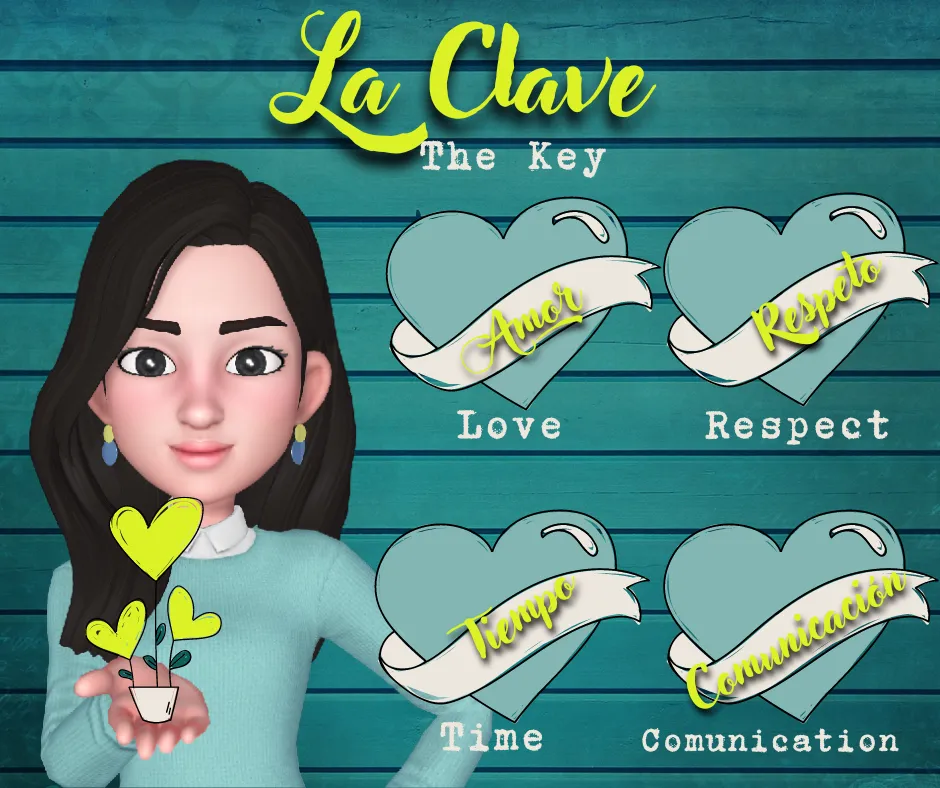

Volviendo al punto de la importancia de expresar nuestros sentimientos a través de las palabras "te quiero" o "te amo". Lo fundamental es que esas frases no solo significan unas palabras y nada más; realmente el poder de esas palabras es sobrehumano, son capaces de disminuir distancias físicas y psíquicas, apaciguar llamas en medio de discusiones, calmar las peores crisis de tristeza, soledad, angustia, demostrar comprensión y empatía hacía el otro, etc, en realidad no son solo palabras ¡son mucho más que solo eso! Y yo lo he demostrado en mis consultas en problemas familiares.
Para concluir mis queridos hivers creo que nunca está demás una demostración de amor hacia quienes queremos, sean quienes sean, porque de esas pequeñas demostraciones es que se basan las relaciones estables de cualquier tipo, son las que proporcionan seguridad y establecen las bases sólidas para seguir adelante.
Asumir que los demás deben saber lo que sentimos nosotros ¡está mal! porque eso puede dar pie a malos entendidos, a falsas suposiciones o a confusiones; tal vez no tengamos una fórmula mágica para mantener una relación se cualquier tipo por largo tiempo, pero de lo que ¡sí estoy segura! es de que el recordarle al otro lo que sientes por él ¡nunca está demás y nunca será demasiado si en verdad se quieren!
Me despido mis queridos #hivers, me gustaría saber lo que piensan al respecto en los comentarios.
Going back to the importance of expressing our feelings through the words "I love you" or "I love you". The fundamental thing is that these phrases do not only mean a few words and nothing more, really the power of these words is superhuman, they are able to diminish physical and psychic distances, appease flames in the middle of arguments, calm the worst crises of sadness, loneliness, anguish, show understanding and empathy towards the other, in reality they are not only words, they are much more than that! And I have demonstrated it in my consultations in family problems.
To conclude my dear hivers, I believe that it is never too much to show love to those we love, whoever they may be, because it is on these small demonstrations that stable relationships of any kind are based, they are the ones that provide security and establish the solid foundations to move forward.
Assuming that others should know how we feel is wrong! because that can lead to misunderstandings, false assumptions or confusion; we may not have a magic formula to maintain a relationship of any kind for a long time, but what I am sure of is that reminding the other what you feel for him/her is never too much and will never be too much if you really love each other!
I'll say goodbye my dear #hivers, I'd love to know what you think about it in the comments.

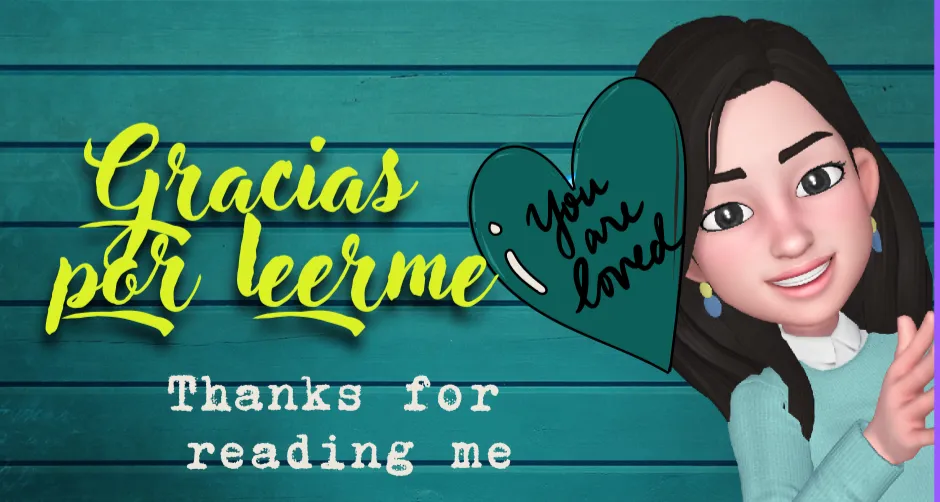

Imagen editing and separators
[ESP] Todas las imágenes fueron creadas en Canvas App y Picsart App por @liveofdalla usando recursos gratuitos de ambas Apps.
[ENG] All images were created in Canvas App and Picsart App by @liveofdalla using free resources from both Apps.
Mis redes sociales | My social Networks
|Twitter|Facebookr|Instagram|
